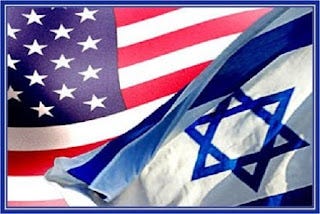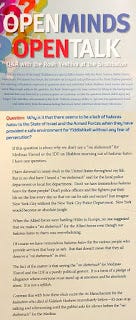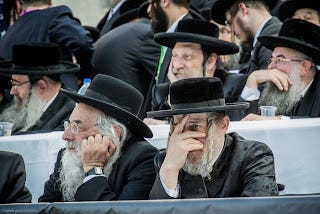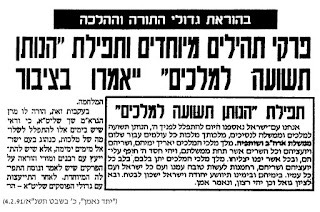Who is Engaged in Politics, and Who in Prayer?
Recently I was forwarded a disturbing newsletter from Yeshivas Toras Moshe. It presented a Q&A which was held with the Rosh Yeshiva, Rabbi Moshe Meiselman (author of the notorious Torah, Chazal and Science), at the yearly Shabbaton. I present it here in full:
Question: Why is it that there seems to be a lack of hakoras hatov to the State of Israel and the Armed Forces when they have provided a safe environment for Yiddishkeit without any fear of persecution?
Answer: If this question is about why we don't say a “mi sheberach" for Medinas Yisroel or the IDF on Shabbos morning out of hakoras hatov, I have one question.I have davened in many shuls in the United States throughout my life. But in no shul have l heard a “mishebeirach” said for the local police department or local fire department. Don’t we have tremendous hakoras hatov for these people? Don’t police officers and firefighters put their life on the line every day so that we can be safe and secure? Just imagine New York City without the New York City Police Department. New York would become an absolute jungle.
When the Allied forces were battling Hitler in Europe, no one suggested that we make a “mi shebeirach” for the Allied forces even though our hakoras hatov for them was overwhelming. Of course we have tremendous hakoras hatov for the various people who provide services that keep us safe. But that doesn’t mean that they all deserve a “mi shebeirach” in shul.
The fact of the matter is that saying the “mi shebeirach” for Medinas Yisroel and the lDF is a purely political gesture. It is a form of a pledge of allegiance where everyone must stand up at attentions and be absolutely silent. It is not a tefilloh.
Contrast this with how these shuls recite the Av Harachamaim for the kedoshim who died al Kiddush Hashem immediately before—it’s non-stop talking and schmoozing until the gabbai asks for silence before the “mishebeirach” for the Medina.
In light of the fact that Rabbi Meiselman's teachings reach many hundreds, even thousands, of students and readers, I think that this requires a response.
Let’s begin with the last paragraph. It’s rather disturbing that Rabbi Meiselman makes such a crass generalization. It is simply not true to generalize that the shuls that pray for Israel and the IDF engage in “non-stop talking” during Av harachamim. (UPDATE: One wonders how many Zionist shuls Rabbi Meiselman is even familiar with, since he mistakenly claims that the prayer for the state is recited after Av harachamim.) And even if there are those who do so, is this due to a formal policy of not expressing care about the martyrs of Jewish history?! Of course not; it’s because these are shuls in which talking during davening is, unfortunately, simply the norm. Those people probably don’t even know what Av harachamim is about. The prayer for Israel and IDF is one whose nature they understand, and furthermore, which deals with matters of current relevance, so naturally it is given greater respect. Rabbi Meiselman’s gratuitous and nasty swipe, and attempt to equate such people with those who have a deliberate policy of formally acknowledging the sacrifices of the IDF, is entirely out of place and out of line.
Rabbi Meiselman claims that while he doesn’t believe in reciting a prayer for the state or the IDF, he certainly has hakaras hatov for “the various people who provide services that keep us safe.” One wonders if this is really the case, or if he is simple paying lip-service to it for his audience. Has he ever spoken in his yeshivah about the gratitude that they must have for the IDF, other than in the context of explaining why they shouldn't pray for their welfare? I doubt it.
Rabbi Meiselman (front left) at the Satmar rally
Recall that Rabbi Meiselman sat on the dais at the notorious Satmar-led protest in Manhattan, where the speakers described Israel as an "evil regime" and spoke about how “the very existence of the state is a rebellion against God” and about how “the [Israeli] army was founded on murder and blood spilling.” And in his own yeshivah, students have been taught that one should not have any hakaras hatov to the State of Israel, because whatever good it does for Torah Jews is no more significant than a terrorist throwing candy to the last surviving child of a family that he has murdered.
Let us address the main argument presented by Rabbi Meiselman, which is that praying for the welfare of the state and for the armed forces is a “purely political gesture” and "is not a tefilloh." This is simply false. There is a long Jewish tradition of reciting Hanosen teshuah lemelachim, which prays for the welfare of the government. The prayer for the State simply reflects the unique Jewish nature of the State of Israel; furthermore, it's not as though Rabbi Meiselman is advocating saying Hanosen teshuah instead!
Now, it’s true that Hanosen teshuah was not recited in every community. Still, it was recited in many communities (including, undoubtedly, communities from which many talmidim in Toras Moshe came). In some cases, the reasons for its recital may indeed have been political in motivation, but there are also certainly traditional Torah values behind it. Yirmiyah says, “Seek the welfare of the city to which I have exiled you, and pray to Hashem on its behalf; for in its prosperity you shall prosper” (Jer. 29:7). Chazal say "Pray for the welfare of the government, for if not for its fear, people would swallow each other alive" (Avos 3:4). Jews, like everyone else, require a government, and they should express their need and gratitude for this.
Praying for the welfare of the state is certainly a traditional Jewish concept. This would be at least as true, and surely even more the case, if the country is the Land of Israel, its inhabitants are mostly Jewish, and the government is that of a Jewish state!
Now let’s turn to the prayer for the armed forces. R. Meiselman claims that just as we have gratitude for the New York City police and fire brigade, yet we do not recite prayers for them, the same should be true for the IDF. Yet is this comparison not shallow? The IDF’s entire purpose is to protect Jewish lives from their enemies who seek to annihilate them, and they risk capture, torture and death, r"l, to do so. When someone’s child joins the police force or fire brigade, their parents don’t stop sleeping at night.
Rabbi Meiselman further claims that nobody ever suggested that we should make a misheberach for the Allied Forces in World War II. Can he really not see a difference between other nations fighting primarily for their own reasons, and our own brethren fighting to protect us?!
Furthermore, in any case, Rabbi Meiselman’s claim is simply not true. In 1942, none other than Rav Yosef Zvi Dushinsky, successor to Rav Yosef Chaim Sonnenfeld as Chief Rabbi of the Eidah Charedis, discussed this very question (Shailos U’Teshuvos Maharitz 47). He was opposed to creating any new form of prayer, but stated that Hanosen teshua should suffice, which, he says, “is the minhag of all the Jewish people.”(See Rabbi Dr. Joseph Tabory, The Conflict of Halacha and Prayer.")
In the past, leading figures in the charedi community have indeed ruled that one should pray for non-Jewish armed forces. In 1918, to mark the first anniversary of the liberation of Jerusalem from the Turks by the British, the Vaad Ha-Ir Ha-Ashkenazi (precursor to the Eidah Chareidis) called on all the shuls and yeshivos “to thank Hashem for the redemption, and the salvation,” and to say the prayer of Hanosen teshuah on behalf of “George the Fifth, yarum hodo (may his glory be increased)” and a misheberach for General Allenby.
Another example is especially striking. During the first Gulf War, both Yated Ne'eman and Hamodia reported that Rav Schach and the Moetzes Gedolei HaTorah had ruled that the charedi community should pray for the welfare of the coalition forces. The Yated was careful to note that this was a matter of following the tradition of praying for the state. The ruling was to use the traditional text of Hanosen teshuah, mentioning “the government of the United States and its partners.”
Note that the charedim were willing to pray for the success and welfare of Syria and Saudi Arabia - but not of Israel! This clearly demonstrates that such wars do indeed qualify for formal religious expressions of concern, but anti-Zionist politics prevents such concern from being expressed for Israel. Another example of this is with the charedi anti-draft rally in New York, in which they didn’t express their gratitude to the IDF, but they thanked the NYPD!
Rabbi Meiselman's claim that praying for the welfare of the state and for the armed forces is a “purely political gesture” is entirely false. As we have seen, the reverse is actually the case. Such prayers are a traditional part of Judaism, being extremely suitable expressions of concern and hakarat hatov. It’s the opposition to these prayers that is purely political.
It is a tragedy that so many boys from homes which reflect traditional Torah values end up in Toras Moshe and are indoctrinated against them.






